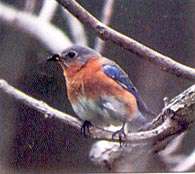Lake of the Ozarks Birdwatching
category : Birdwatching
 "The Missouri Ozarks is one of the most productive breeding areas for migratory birds in the hemisphere. Neotropical migrants such as the Ruby-throated Hummingbird, Northern Oriole, Woodthrush, and over 100 other species of songbirds, nest in the Midwest during summer and then migrate to Central and South America for the winter."
"The Missouri Ozarks is one of the most productive breeding areas for migratory birds in the hemisphere. Neotropical migrants such as the Ruby-throated Hummingbird, Northern Oriole, Woodthrush, and over 100 other species of songbirds, nest in the Midwest during summer and then migrate to Central and South America for the winter." - The Missouri Conservationist, July 1995
The Lake of the Ozarks is one of the best birding spots in Missouri. Although man-made, the Lake functions as a natural water environment that is a feeding and resting grounds for numerous species of wildlife, including a spectacular variety of birds.
Familiar Species
Species that are a familiar sight on the Lake (and in the area), include the Great Blue Heron, hawks and ducks of many varieties, Wild Turkey, Pectoral Sandpipers, Cliff Swallows, Terns, American Goldfinches, Ruby-throated Hummingbirds, Robins, Bobwhites, Whippoorwills, Cardinals, Blue Jays, Wood Thrushes, Eastern Meadowlarks, Phoebes, Belted Kingfishers, Pileated Woodpeckers and the "leftovers" king of the sky, the Turkey Vulture.
Other species (including the Summer Tanager, similar to a cardinal except with no crest on its head, and the Indigo Bunting, blue with black on its wings and found in timbered areas), too numerous to mention can be sighted at Lake of the Ozarks. Excellent areas for viewing are just about anywhere that's outside - sometimes even driving down the road or off the deck of your condo or resort, or around your campsite - but always on the Lake or the rivers, and in the woods.
Blue Heron
The Great Blue Heron, often on the Lake, makes its nest in quieter spots along secluded rivers or creeks, away from human activity. If disturbed very often, they will desert these sanctuaries. They live in colonies or "rookeries." One such rookery can be found 3/4 mile south of Bagnell on the east side of the Osage River, where there has been as many as 80 nests. The Heron family is related to the Oriental Bird of Paradise, considered to be good luck in that part of the world.
Bald Eagles
Bald Eagles arrive in October and are here until mid or late March. A few have been known to nest on the Lake but the close proximity of homes and man prevent any accumulation. Although a fair amount have been seen on the Little and Big Niangua arms, some of the best concentrations can be found near Old Bagnell, and just below Bagnell Dam, on the Osage River. (eagles, terns and gulls chase shad and dive for fish especially when the dam turbines are operating.) There is a Conservation Access about 300 yards downstream of the Dam area for viewing. Although rare, Golden Eagles have also been observed in the area. Both bald eagles and ringbilled gulls migrate from the Great Lakes region to winter here.
Other birds that have been sighted as they migrate are Canada Geese, the White Pelican and Trumpeter Swans. Double Crested Cormorants (large birds with a long black neck), or "Water Turkey" have also been observed sometimes in groups of 30 - in the shallow areas around Swinging Bridges off Hwy 42, near Brumley.
Eastern Phoebes and Northern Rough-winged Swallows make their mud nests on the bluffs that contour the Lake. These can be found across from McCubbins Point on the Glaize Arm, and around the bluffs at the 15 and the 25 Mile Marker on the Osage Arm.
Public Access Areas
Easily accessible to the public are the Lake of the Ozarks State Park and Ha Ha Tonka State Park. They say the last raven ever seen in Missouri was at Ha Ha Tonka. Saline Valley Conservation Area, a 3,500 acre Public Access is a natural habitat (no trails), where Wild Turkey and Quail are plentiful along Saline Creek. The entrance is located approximately three miles south of the junction of Hwy 54 and M, near Eldon.
Plant life, blooming trees (around the first two weeks of April) and countless wildflowers are an extra bonus from early spring through fall, including many species of ferns
Phone: 573-348-1599
Our Email: locvb@usmo.com
Our Website:www.funlake.com
Come visit us in Lake Of The Ozarks, Missouri